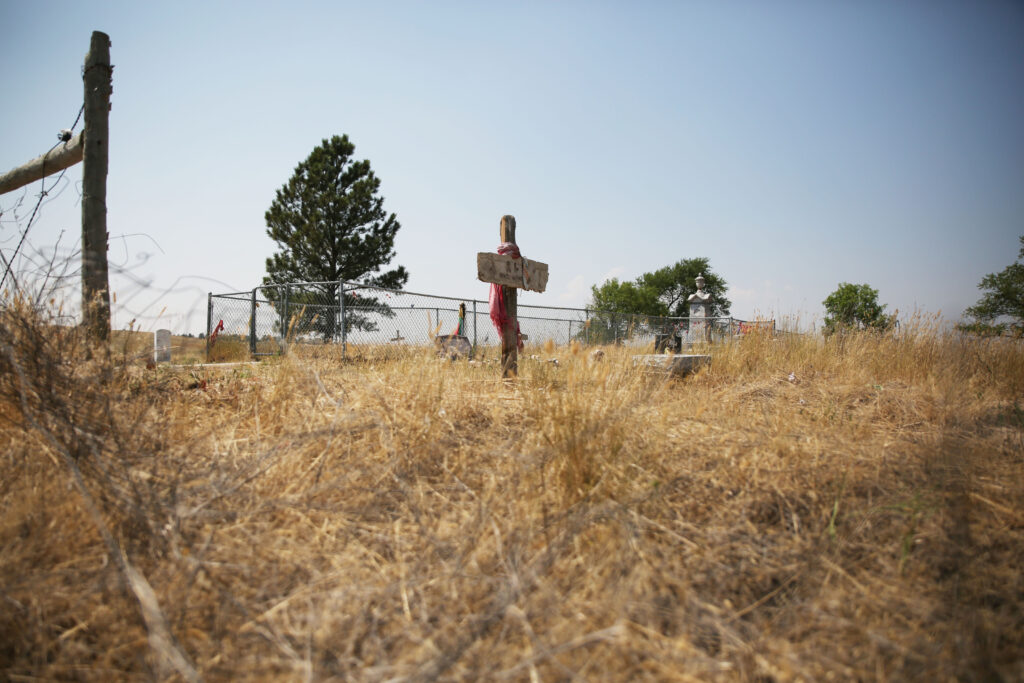A wooden cross marks a grave at the Wounded Knee Memorial on the Pine Ridge Reservation. (Makenzie Huber/South Dakota Searchlight)
Leading Catholic officials in western South Dakota have issued a statement saying they “firmly reject” the secretary of defense’s recent affirmation of medals awarded for the 1890 Wounded Knee Massacre.
The written statement is from the Most Rev. Scott Bullock, bishop of Rapid City, and the De Smet Jesuit Community of West River, South Dakota. The faith leaders said the facts of the historical tragedy are “clear,” and the massacre “was not a battle.”
“Those who died at Wounded Knee are sacred. Jesus stands with all who suffer and die at the hands of others,” said the statement, issued Monday. “Those who committed the violence are also sacred; for this reason, Jesus offers them mercy and healing. Yet the acts themselves were grave evils and cannot be honored.”
Focus on individual conduct instead of massacre doomed Wounded Knee medals review, panelist says
Secretary of Defense Pete Hegseth announced last month that the medals awarded to soldiers for their participation in the massacre will not be rescinded. He called the massacre a “battle” and said soldiers “deserve” the medals they were awarded.
Hegseth’s predecessor during the Biden administration, Lloyd Austin, created a panel last year to review the medals. At the time, the Department of Defense said “approximately 20” soldiers had received a Medal of Honor for participating in the massacre. Historians have said the records associated with some of the medals are incomplete or unclear.
There was no public report from the panel and no public action on the matter before Biden left office. Hegseth made his announcement in a social media video, while holding a report that he said was generated by the panel. The Defense Department has not published the report or responded to South Dakota Searchlight’s requests for a copy.
Hegseth said the review panel recommended against rescinding the medals, and he alleged that Austin declined to publicize the recommendation because “he was more interested in being politically correct than historically correct.”
The Catholic faith leaders addressed that criticism in their statement.
“To recognize these acts as honorable is to distort history itself,” the statement said. “Our response, therefore, is rooted not in ‘political correctness’ but in prayerful correctness, grounded in truth, conscience, and compassion.”
The massacre occurred after years of conflict between the Lakota nation and the U.S. government had concluded with many Lakota people ordered onto reservations. On Dec. 29, 1890, a large group of Lakota people traveling to the Pine Ridge Agency in southwestern South Dakota made camp near Wounded Knee Creek, where they were surrounded by hundreds of Army soldiers. A shot rang out while the soldiers tried to disarm the camp, and the soldiers opened fire.
Fewer than 40 soldiers were killed (some by friendly fire, according to historians), while estimates of Lakota deaths ran from 200 to 300 or more, depending on the source, including men, women and children. After some of the bodies froze on the ground for several days, a military-led burial party placed them in a mass grave.
One hundred years later in 1990, Congress passed a resolution expressing “deep regret” for the massacre.
Wounded Knee Joint Statement 2025
A statement issued Oct. 20, 2025, by the bishop of Rapid City and the De Smet Jesuit Community of West River, South Dakota.


